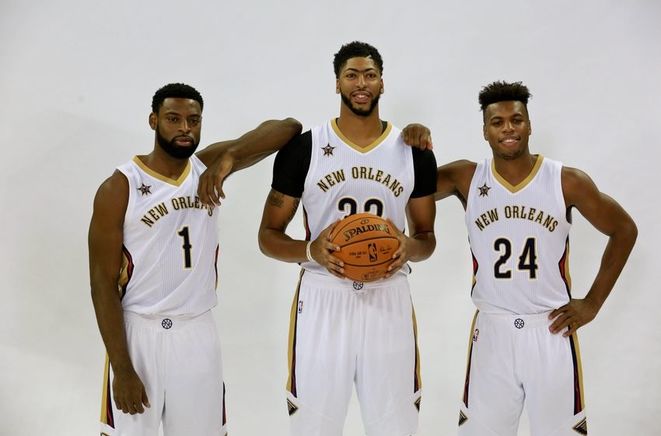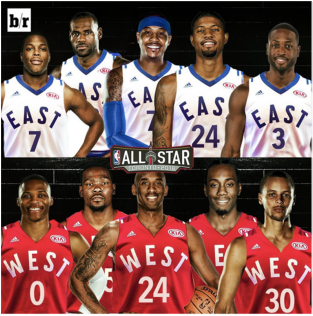Anthony Davis is legit, that much is for sure. He is currently putting together his best season to date, with averages of 31.6 points, 11.4 rebounds, 2.8 blocks, and 1.7 steals on excellent shooting percentages of 50.3% from the field and 82.3% from the line. It's not just the raw stats, either: Davis leads the league in Player Efficiency Rating (PER) -- a statistic that gauges a player's overall value -- at 31.13, as well as killing the competition in other advanced metrics such as Value Added (234.0, the next closest is 219.9) and Estimated Wins Added (7.8, next closest is 7.3) which measure how much value and wins, respectively, a player adds to his respective team. To cap it all off, AD is once again making the case for why he is the best defensive player in basketball, leading the league in both blocks per game, combined blocks and steals per game, as well as holding onto the top spot in the advanced metric known as Defensive Win Shares. Given that at 31.6, he's also leading the NBA in points per game, one might even argue that the Pelican big man is the most dominant two-way force that basketball has to offer. Did I mention he's only 23?
But his Pelicans have not been keeping up. At all. Their records in the first four seasons that they've had Davis have been: 27-55 (0.329 in 2012-13), 34-48 (0.415), 45-37 (eigthth seed in West, swept by GSW in first round), and 30-52 (0.366) last season. Now, they're 7-15 (0.318) and heading straight for the gutter in another lost season.
But this can't be the new normal, not when you have arguably basketball's best individual player in the prime of his career, lighting up box scores night after night. So how did they manage to put a roster around Davis that's so bad, that the team is near the bottom of the standings every year despite the fact that they have one of basketball's premier talents?
Well the situation really started spiraling downhill on draft night in 2013, when the Pelicans appeared to be searching for a talented young prospect to pair with AD for years to come. At #6 overall, they found top prospect Nerlens Noel available on the board, and got a call from Philly.
Long story short, New Orleans ended up shipping Noel, as well as their first-round selection the following year, for the young Jrue Holiday. The young Holiday was a bit of a question mark given his fairly sudden rise, but had nonetheless put up 17.7 points and 8.0 assists per game that season.
But alas, Holiday has been plagued by injuries and inefficient shooting ever since, and remains a decent -- nothing more, nothing less -- starting point guard today.
The moral of the story here is don't put all your eggs in one basket. Two first-rounders -- especially the high selections that New Orleans ended up shipping to Philly -- are extremely valuable, and it was highly imprudent -- though luck was certainly not on their side -- of the Pelicans' management to simply send them away without receiving an absolutely sure thing in return.
Soon after, the team announced that it would be sending away another first-rounder (in 2015) for C Omer Asik. This meant that the front office had decided that they needed to shift Davis to his unnatural position of power forward, sending three-point sniper PF Ryan Anderson to the bench, despite the fact that the two had actually played very well together. Defenders of the Asik trade claim that the Anderson-Davis pairing resulted in a negative plus-minus rating for the team as a whole, but the stats were in fact very misleading here: the two often played together when the Pelicans would send their bench, or worst players, out onto the court for the other three slots in the lineup. The Davis-Asik pairing was highly redundant -- both excelled at rebounding and blocking -- and was never really much of a success. To make matters worse, New Orleans extended Asik to a 5 year/$60 million contract in 2015, and now he's simply good for grabbing six rebounds in 18 minutes per game, and nothing else. That $60 million also meant that the team couldn't afford to hang onto Anderson, who actually complimented Davis' talents well.
I could go on and disect every single one of New Orleans' moves from the past five years -- the Tyreke Evans and Eric Gordon debacles come to mind -- but I think you get the idea. Management in The Big Easy was far too wasteful with first-round picks that should otherwise be precious, and were overall simply too imprudent in the decision-making process. They did well to lock up AD to a monster long-term extension this past summer, but creating talent around him is a challenge. At this moment, Holiday is the team's beta dog, and that explains the team's 7-15 record pretty well. I actually commend the selection of Buddy Hield in this year's draft, and perhaps over time and with better management as their players develop, NOLA may be able to avoid a LeBron 2010 situation and actually build a legitimate contender around Davis.
But his Pelicans have not been keeping up. At all. Their records in the first four seasons that they've had Davis have been: 27-55 (0.329 in 2012-13), 34-48 (0.415), 45-37 (eigthth seed in West, swept by GSW in first round), and 30-52 (0.366) last season. Now, they're 7-15 (0.318) and heading straight for the gutter in another lost season.
But this can't be the new normal, not when you have arguably basketball's best individual player in the prime of his career, lighting up box scores night after night. So how did they manage to put a roster around Davis that's so bad, that the team is near the bottom of the standings every year despite the fact that they have one of basketball's premier talents?
Well the situation really started spiraling downhill on draft night in 2013, when the Pelicans appeared to be searching for a talented young prospect to pair with AD for years to come. At #6 overall, they found top prospect Nerlens Noel available on the board, and got a call from Philly.
Long story short, New Orleans ended up shipping Noel, as well as their first-round selection the following year, for the young Jrue Holiday. The young Holiday was a bit of a question mark given his fairly sudden rise, but had nonetheless put up 17.7 points and 8.0 assists per game that season.
But alas, Holiday has been plagued by injuries and inefficient shooting ever since, and remains a decent -- nothing more, nothing less -- starting point guard today.
The moral of the story here is don't put all your eggs in one basket. Two first-rounders -- especially the high selections that New Orleans ended up shipping to Philly -- are extremely valuable, and it was highly imprudent -- though luck was certainly not on their side -- of the Pelicans' management to simply send them away without receiving an absolutely sure thing in return.
Soon after, the team announced that it would be sending away another first-rounder (in 2015) for C Omer Asik. This meant that the front office had decided that they needed to shift Davis to his unnatural position of power forward, sending three-point sniper PF Ryan Anderson to the bench, despite the fact that the two had actually played very well together. Defenders of the Asik trade claim that the Anderson-Davis pairing resulted in a negative plus-minus rating for the team as a whole, but the stats were in fact very misleading here: the two often played together when the Pelicans would send their bench, or worst players, out onto the court for the other three slots in the lineup. The Davis-Asik pairing was highly redundant -- both excelled at rebounding and blocking -- and was never really much of a success. To make matters worse, New Orleans extended Asik to a 5 year/$60 million contract in 2015, and now he's simply good for grabbing six rebounds in 18 minutes per game, and nothing else. That $60 million also meant that the team couldn't afford to hang onto Anderson, who actually complimented Davis' talents well.
I could go on and disect every single one of New Orleans' moves from the past five years -- the Tyreke Evans and Eric Gordon debacles come to mind -- but I think you get the idea. Management in The Big Easy was far too wasteful with first-round picks that should otherwise be precious, and were overall simply too imprudent in the decision-making process. They did well to lock up AD to a monster long-term extension this past summer, but creating talent around him is a challenge. At this moment, Holiday is the team's beta dog, and that explains the team's 7-15 record pretty well. I actually commend the selection of Buddy Hield in this year's draft, and perhaps over time and with better management as their players develop, NOLA may be able to avoid a LeBron 2010 situation and actually build a legitimate contender around Davis.



 RSS Feed
RSS Feed